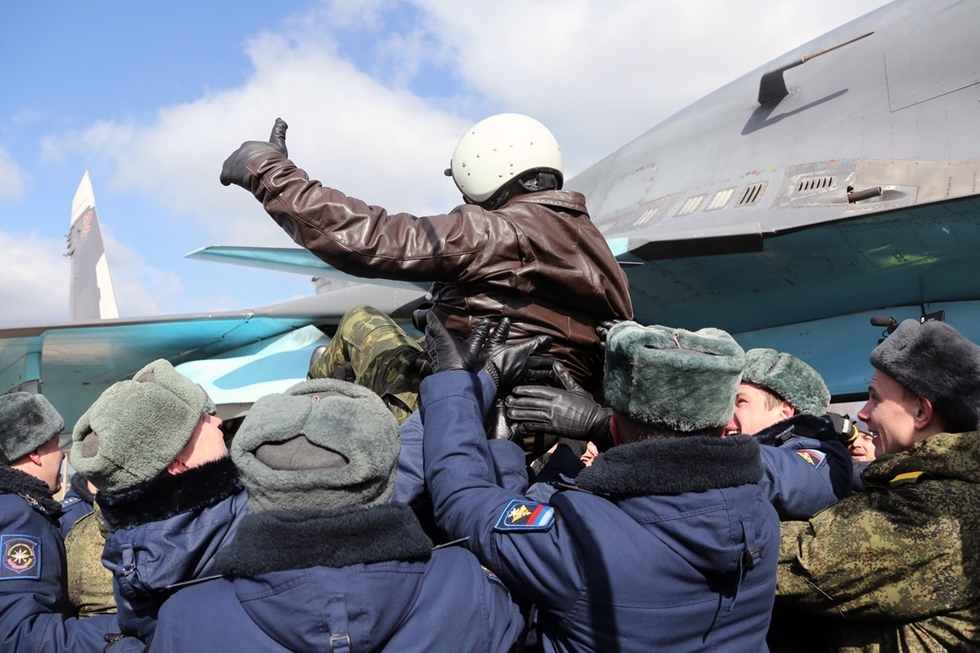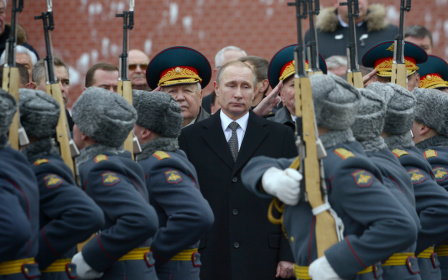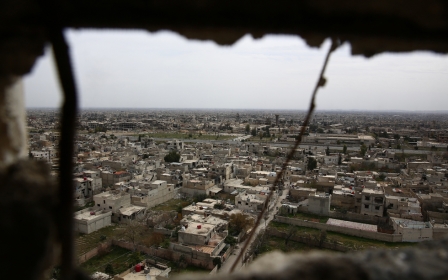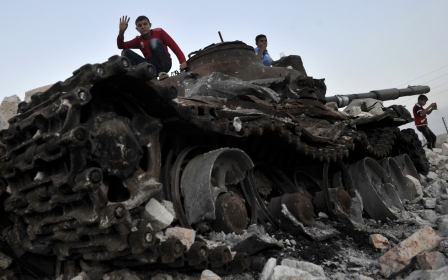First Russian jets leave Syria after order to withdraw

Russian pilots received a hero's welcome after returning home from deployment in Syria, following President Vladimir Putin's announcement that Moscow would withdraw the "main part" of its military forces in the country.
Several Su-34 strike fighters on Tuesday landed at an airbase outside Voronezh, 360 miles southeast of Moscow, after performing a fly-past for top commanders, relatives and supporters.
They were among the first to leave Hmeimim air base in Syria following Putin's decision on Monday evening.
"The first group of Russian planes has flown out of the Hmeimim air base for their permanent bases on the territory of the Russian Federation," the Russian defence ministry said in a statement, adding that they included Su-34 bombers and a Tu-154 transport plane.
The UN's envoy to Syria, Staffan de Mistura, called the withdrawal a 'significant development' for peace talks currently being held in Geneva.
"We hope will have a positive impact on the progress of the negotiations," he said.
A video published on YouTube by the Russian defence ministry showed Su-34 jets taking off from Hmeimim and flying in formation with a Tu-154.
However, Russian assets remaining in Syria carried out bombing runs near the Islamic State-held town of Palmyra, according to the Syrian Observatory activist group.
The Kremlin also said its air defence systems and other equipment would remain in Syria to assist its ongoing campaign against "terrorist" groups.
The partial withdrawal comes after Putin announced on Monday that the country would pull out most of its forces providing military support to Syrian President Bashar al-Assad's government.
Putin said he hoped the withdrawal would provide a "good signal" for all warring sides, with government and opposition representatives currently in Geneva, Switzerland, for the latest round of United Nations-brokered peace talks aimed at ending the five-year conflict.
Speaking at a meeting in the Kremlin with his defence and foreign ministers, Putin reportedly said that the Russian military, which began bombing Syria last September, had achieved the bulk of its objectives.
"The effective work of our military created the conditions for the start of the peace process," Putin said.
"I believe that the task put before the defence ministry and Russian armed forces has, on the whole, been fulfilled. With the participation of the Russian military... the Syrian armed forces have been able to achieve a fundamental turnaround in the fight against international terrorism and have taken the initiative in almost all respects," Putin said.
Syria's main opposition hailed the decision late on Monday, but said it would wait and see what impact the order would have on the ground.
"We must verify the nature of this decision and its meaning," Salem al-Meslet, spokesman for the opposition High Negotiations Committee told reporters in Geneva.
"If there is a decision to withdraw the [Russian] forces, it is a positive decision, and we will see it on the ground, [but] does this decision mean removing forces or just reducing the number of aircraft in Syria, [that] we will have to check," he said.
The United Nations Security Council also welcomed the move.
"The decision just announced today by the Russian president - that's a positive step," said Angolan ambassador Ismael Gaspar Martins, who holds the council's rotating presidency this month.
"That's what we like to see."
Germany's foreign minister Frank-Walter Steinmeier said the withdrawal would put pressure on Assad to negotiate a "political transition," rather than seeking a total military victory over opposition rebels.
"If the announcement of a withdrawal of Russian troops materialises, this increases the pressure on President Assad to finally negotiate in a serious way in Geneva a political transition which maintains the stability of the Syrian state and the interests of all populations," Steinmeier said in a statement.
Despite the withdrawal, Russia will maintain a military presence in Syria at the Hmeimim airbase and at its permanent naval base in the port of Tartous.
Julien Barnes Dacey, a senior policy fellow with the European Council on Foreign Relations, said the timing of the announcement, coming on the back of the ceasefire and with the beginning of the talks was "not a coincidence".
"It seems that this is signalling both to Assad and other parties that the Russians are not going to facilitate an absolute Assad victory - and that the political process needs to be taken seriously now and that Russian influence will be used in that direction," Barnes Dacey told Middle East Eye.
It was likely that Russia would continue air strikes although, he said, it remained to be seen whether the level of intensity would be sustained.
But foremost, the announcement is about political signalling, firstly to the Syrians that they need to take the political process seriously, but also to the other parties at the negotiation table that Moscow is serious about the political track, he added.
However, it is too early to say if the signals from Moscow will have a positive development, said Chris Doyle, the director of the Council for Arab-British Understanding.
“If this is a message to the regime that it has to take the talks seriously and to the Americans that it is willing to push Assad, then it could help,” said Doyle.
“But it depends on the political will of all the parties on the table, so it is a small step of many [that are needed] to completely and utterly transform the political climate and bring the two divided sides together.
New MEE newsletter: Jerusalem Dispatch
Sign up to get the latest insights and analysis on Israel-Palestine, alongside Turkey Unpacked and other MEE newsletters
Middle East Eye delivers independent and unrivalled coverage and analysis of the Middle East, North Africa and beyond. To learn more about republishing this content and the associated fees, please fill out this form. More about MEE can be found here.





